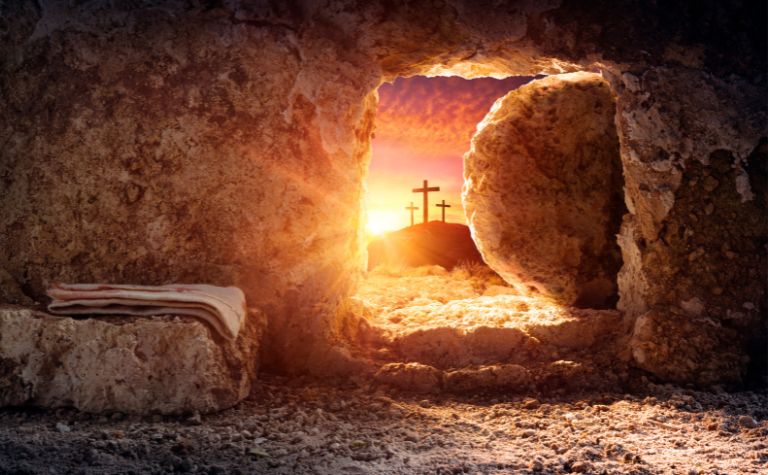The founder of a religion or faith is the person who started and established it. Knowing who found a belief system and its accompanying way of life helps followers and observers to understand its values, priorities, and convictions. Unlike other faiths, the foundation of Christianity doesn’t only consist of what its founder said but who he was.
The founder of Christianity is Jesus of Nazareth, also known as “Jesus Christ.” The title “Christ” is the Greek equivalent of the Hebrew term “Messiah.” Jesus lived in Israel early in the first century. His ethnicity was Jewish. His trade was carpentry. His identity was that he was God in human flesh.
What did Jesus say about the Kingdom of God? What is the Gospel? What are the characteristics of a follower of Jesus? Keep reading to learn the answers to these questions and see a detailed timeline of Jesus’ time on earth, including important dates and events of his life and ministry.
Also see Who Was the Christian Martyr? to learn more.

What did Jesus Christ teach? The Kingdom and the Gospel
The kingdom of God, which refers to his rule and reign over history and people, was an important theme in Jesus’ teaching. Incorporating Jesus’ teaching about the kingdom of God in the New Testament with what the Old Testament reveals about it, five aspects emerge.
- The kingdom includes God’s universal reign as king over creation (Psa. 47:7)
- The kingdom includes Israel (Exod. 19:5-6)
- The kingdom includes a king from the line of David (2 Sam. 7)
- The kingdom has arrived in the person of Jesus (Mark 1:14-15)
- The kingdom isn’t fully here yet (Matt. 25:34)
Is the kingdom of God a democracy? The king of the kingdom, Jesus (cf. Rev. 19:16), has absolute rule and governs according to his standards. The role of the king’s people, followers of Jesus, isn’t to challenge the king’s standards but to submit to them in complete obedience.
Has the kingdom of God fully arrived? Jesus taught that the Kingdom of God has come but is not yet fully manifested. The kingdom has arrived because Jesus has confronted and conquered Satan and demons. The Gospels illustrate this with stories about Jesus casting out demons and resisting Satan (Matt. 4:1-11). Jesus also taught that the kingdom would one day come in full (Matt. 6:10; 25:31-46).
“If you wish to come into God’s kingdom, therefore, you must ask God to rescue you ‘from the dominion of darkness’ and bring you ‘into the kingdom of the Son He loves’ (Col. 1:13). You must renounce your deal with the devil and swear allegiance to Christ the King.” – Philip Graham Ryken in When You Pray, p. 83-84.
Also see How Did Christianity Spread? to learn more.
What is the gospel of Jesus Christ?
The word “gospel” comes from the Greek word euaggelion, meaning “good news.” Who Jesus was and what he did for sinners is what the gospel proclaims. The gospel is good news because the nature and destiny of sinners, without Jesus, is so bad. To understand how great the gospel is, it’s necessary to understand what the Bible teaches about how all people are born into the world.
All people have sinned
The Bible teaches that all people sin and that no one is perfect (Rom. 3:23). It doesn’t matter what race a person is, what nation or culture they are part of, what gender they are, or what social standing they have. Everyone falls short of God’s moral standards. Therefore, everyone is a sinner and in need of a Savior.
The consequence of sin is death
Sin, which is a thought, word, deed, or intention that offends God and violates his standard, separates a person from the Author and Sustainer of life. Therefore, the consequence of sin is death. Death means physical and spiritual death, which lasts for eternity (cf. Matt. 25:46).
In Romans 6:23, Paul writes, “For the wages of sin is death, but the free gift of God is eternal life in Christ Jesus our Lord.” As the verse teaches, what can reverse sin’s consequences is a free gift. “Free” is another way to say that God saves sinners because he is gracious: “even when we were dead in our trespasses, made us alive together with Christ—by grace you have been saved” (Eph. 2:8).
Jesus Christ paid the penalty for sin
The New Testament teaches that Jesus took people’s place on the cross and paid the penalty for their sins. What motivated him to do this was love. Romans 5:8 reads, “God shows his love for us in that while we were still sinners, Christ died for us.” (cf. John 3:16)
How do people respond to the gospel?
The Bible is clear that God invites people to respond to the gospel. In other words, once people understand the penalty that Jesus took for them on the cross, they must personally respond to it. The New Testament often presents responding to the gospel as an invitation.
- John 1:12, “To all who did receive him, who believed in his name, he gave the right to become children of God.”
- Matthew 11:28, “Come to me, all who labor and are heavy laden, and I will give you rest.”
- Revelation 3:20, “Behold, I stand at the door and knock. If anyone hears my voice and opens the door, I will come in to him and eat with him, and he with me.”
It doesn’t matter if a person’s parents are Christians, they are members of a church, or they are “a good person” and mostly kept The 10 Commandments. Each individual must respond to the gospel to be saved.
Sinners must respond with repentance and faith
- Mark 1:15, “The time is fulfilled, and the kingdom of God is at hand; repent and believe in the gospel.”
- Acts 20:21, “testifying both to Jews and to Greeks of repentance toward God and of faith in our Lord Jesus Christ.”
Some passages mention forgiveness and may imply faith: “Thus it is written, that the Christ should suffer and on the third day rise from the dead, and that repentance for the forgiveness of sins should be proclaimed in his name to all nations, beginning from Jerusalem.” (Luke 24:46-47)
Other passages mention faith and may imply confession of sin: “If you confess with your mouth that Jesus is Lord and believe in your heart that God raised him from the dead, you will be saved. For with the heart one believes and is justified, and with the mouth one confesses and is saved.” (Romans 10:9-10)
The New Testament also highlights the results of responding to the gospel of Jesus Christ with repentance and faith.
- Eternal life: “For God so loved the world, that he gave his only Son, that whoever believes in him should not perish but have eternal life.” (John 3:16)
- Forgiveness of sin: “But what God foretold by the mouth of all the prophets, that his Christ would suffer, he thus fulfilled. Repent therefore, and turn back, that your sins may be blotted out.” (Acts 3:18-19)
- Assurance of acceptance: “All that the Father gives me will come to me, and whoever comes to me I will never cast out.” (John 6:37)
“Jesus is not one of many ways to approach God, nor is He the best of several ways; He is the only way.” – A.W. Tozer
Also see Why Do Christians Worship on Sundays? to learn more.

What are the characteristics of a follower of Jesus?
A disciple is someone who follows Jesus. Following Jesus doesn’t look the same for every person, but there are common elements to every disciple’s life. Below, readers will find descriptions of the foundational elements of following Jesus with supporting verses.
The list isn’t exhaustive, so readers are encouraged to develop daily Bible reading habits to understand more about being a disciple of Jesus.
Disciples have a relationship with Jesus
People who follow Jesus don’t merely subscribe to certain religious or spiritual information. Instead, disciples follow a person — Jesus — which affects their beliefs and behaviors.
They don’t follow from a distance, either. Disciples know Jesus personally, and he knows them intimately. A person can’t follow Jesus without knowing Jesus.
- John 17:3, “And this is eternal life, that they know you the only true God, and Jesus Christ whom you have sent.”
- Revelation 3:20, “Behold, I stand at the door and knock. If anyone hears my voice and opens the door, I will come in to him and eat with him, and he with me.”
“What were we made for? To know God. What aim should we have in life? To know God. What is the eternal life that Jesus gives? To know God. What is the best thing in life? To know God. What in humans gives God most pleasure? Knowledge of Himself.” – J.I. Packer
Disciples deny themselves and prioritize Jesus
The fallen world, sinful human nature, and the devil have one set of values, beliefs, and priorities. Jesus has another set. Disciples deny themselves on a daily basis and live for Jesus instead.
Followers of Jesus don’t do this perfectly, but they do it consistently and purposefully look for ways to mature and strengthen the efforts to prioritize Jesus.
- Luke 9:23, “And he said to all, ‘If anyone would come after me, let him deny himself and take up his cross daily and follow me.'”
- 2 Corinthians 5:15, “And he died for all, that those who live might no longer live for themselves but for him who for their sake died and was raised.”
“The call of discipleship will cost you popularity, possessions, and position. But God will use your commitment. The grace of God will be multiplied in you if you cultivate a fixed resolution to live for the glory of God.” – Steven Lawson [2]
Disciples cooperate with the Holy Spirit to grow in the likeness of Christ
People who follow Jesus aren’t looking to be a better version of themselves in the same way that the self-help industry teaches about personal growth.
Instead, a disciple’s heart is to be more like Jesus. They share John the Baptist’s desire when he says of Jesus, “He must increase, but I must decrease” (John 3:30).
- Romans 8:29, “For those whom he foreknew he also predestined to be conformed to the image of his Son, in order that he might be the firstborn among many brothers.”
- 2 Corinthians 3:18, “And we all, with unveiled face, beholding the glory of the Lord, are being transformed into the same image from one degree of glory to another. For this comes from the Lord who is the Spirit.”
“The good that God works for in our lives is conformity to the likeness of His Son. It is not necessarily comfort or happiness but conformity to Christ in ever-increasing measure in this life and in its fullness in eternity.” – Jerry Bridges [3]
Also see How To Become a Christian to learn more.

A timeline of Jesus’ life: Birth to Adolescence (5-8 A.D.)
How can Jesus have been born B.C. — “Before Christ”? People didn’t divide history into “before the life of Christ” and “after the life of Christ” for several hundred years after Christ died.
Though some theologians and Christian historians began the practice around the 6th century, it wasn’t in widespread use until the 10th century. The dates used to calculate the birth of Christ failed to account for several historical details, making their estimation 4 to 6 years off.
| Event | Dates | Scripture |
|---|---|---|
| Jesus is born | 5-6 B.C. | Matt. 1:24-25 |
| Jesus, Mary, and Joseph flee to Egypt | 3-4 B.C. | Matt. 2:1-12 |
| Adolescent Jesus teaches in the temple | 7-8 A.D. | Luke 2:46-47 |
The Start of Jesus’ Public Ministry: 27 A.D.
| Event | Dates | Scripture |
|---|---|---|
| John the Baptist baptizes Jesus | 26-27 A.D. | Matt. 3:13-17 |
| Jesus’ first miracle at Cana | 26-27 A.D. | John 2:1-11 |
| Jesus is tempted in the wilderness | 26-27 A.D. | Matt. 4:1-11 |
| Jesus cleanses the temple | 27 A.D. (Winter) | John 2:13-15 |
| Jesus meets Nicodemus | 27 A.D. (Winter) | John 3:1-21 |
| Jesus meets the Samaritan woman | 27 A.D. (Winter) | John 4:5-42 |
| Jesus begins to preach in Galilee | 27 A.D. (Fall) | Luke 4:42-44 |
The Time of Popularity: 28 A.D.
| Event | Date | Scripture |
|---|---|---|
| Jesus chooses 12 disciples | 28 A.D. (Winter) | Mark 3:13-19 |
| Jesus preaches the Sermon on the Mount | 28 A.D. (Spring) | Matt. 5:1-7:29 |
| Jesus ministers in Galilee again | 28 A.D. (Summer) | Luke 8:1-3 |
| Jesus sends out the 12 | 28 A.D. (Fall) | Matt. 9:35-11:1 |
| Jesus calms the storm | 28 A.D. (Fall) | Luke 8:22-25 |
The Time of Opposition: 29-30 A.D.
| Event | Date | Scripture |
|---|---|---|
| Jesus feeds 5,000 | 29 A.D. (Spring) | Matt. 14:13-21 |
| Jesus transfiguration | 29 A.D. (Summer) | Matt. 17:1-13 |
| Jesus attends the Festival of Tabernacles | 29 A.D. (Fall) | John 7:11-52 |
| Jesus begins his last trip to Jerusalem | 30 A.D. (Winter) | Luke 17:11 |
| Jesus resurrects Lazarus | 30 A.D. (Winter) | John 11:1-44 |
| Jesus is crucified and resurrected | 30 A.D. (Spring) | John 19:17-42 |
Also see How To Be A Better Christian to learn more.
References:
[1] Source
[2] Source
Related Questions
The rapid spread of Christianity in the first few centuries after Jesus Christ is one of the most miraculous stories in world history. The incredible expansion of Christianity is rooted in its...
Jesus Christ prayed that his followers would be one (John 17:22). Sadly, Christian history shows that sometimes political, ecclesiastical, and theological discord have stood in the way of such unity....
